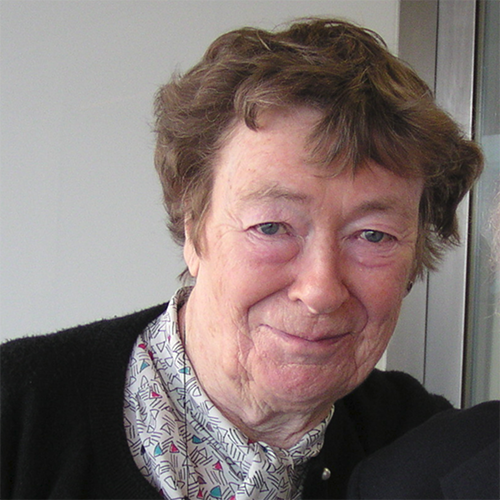Brenda Bigland-Ritchie Award
The Brenda Bigland-Ritchie Award recognizes outstanding mid-career researchers who have applied innovative methods of electrophysiology or kinesiology to advance our understanding of the physiology / neurophysiology of human movement.

About Brenda Bigland-Ritchie
(September 23, 1927 – March 25, 2019)
Dr. Brenda Bigland-Ritchie was a pioneering scientist who has made seminal contributions to our understanding of skeletal muscle physiology. Her research focused on the metabolic cost of muscle shortening and lengthening contractions, the relationship between muscle activation and force, the analysis of motor unit rate coding in humans, and the processes underlying muscle fatigue. She was highly innovative in her application of novel methodologies and devoted considerable effort to relate the results of human experiments to those obtained from animal research.
Dr. Bigland-Ritchie began her undergraduate education in Physiology and worked as a research fellow at University College London. After a break from university to take care of her children, she returned to part-time research and to teaching at Hunter College and at Marymount College in Tarrytown in New York. She then obtained her PhD for the research conducted when she was at University College London. She got a tenure at Quinnipiac College, Connecticut, where she later joined the John B Pierce Laboratory and the Department of Pediatrics at Yale University School of Medicine. She concluded her career working at The Miami Project to Cure Paralysis, Department of Neurological Surgery, University of Miami Miller School of Medicine, Florida.
ISEK is pleased to invite nominations for the Brenda Bigland-Ritchie award. The award will be awarded for the first time in 2026.
The award consists of a complimentary registration to the following ISEK congress, a $750 travel honorarium, presentation in the Award Session at the Congress as well as recognition in the Congress program. This award will be presented at the ISEK congress and can only be received once by an individual.
Criteria for Application:
This award will recognize an outstanding mid-career researcher, who:
- Is more than 8 and less than 20 years since receiving their PhD.
- Has applied innovative methods of electrophysiology or kinesiology to study movement.
- Has advanced our understanding of the physiology / neurophysiology of human movement.
- Has a strong publication record across translational fields that include either:
- (i) both human and animal-based studies, OR
- (ii) both fundamental and clinical sciences, including studies with patient populations.
- Is ideally a member of ISEK (but this is not essential)
- Is able to attend the following ISEK congress, where the award will be presented
Nomination:
We encourage members to recognize the current diversity in our field when making nominations. To nominate an individual or self-nominate, please submit the following:
- A maximum 2-page cover letter (or nomination letter) that highlights how all criteria are met. This should include reference to 3-4 papers led (as either first or last author) by the nominee that have (i) applied innovative methods of electrophysiology or kinesiology to study movement, and (ii) advanced our understanding of the physiology / neurophysiology of human movement, (iii) across translational fields.
- A maximum 4-page CV detailing the breadth of the applicant’s academic contribution in line with the criteria above.
Nominations open September 15, 2025
Nominations close October 31, 2025
Nominations should be submitted via email to the Society at:
Award Conflict of Interest Policy
To uphold the integrity and fairness of our ISEK’s award selection processes, the following guidelines are established for Council members involved in nominations and voting of ISEK fellowship nominations, awards connected to the ISEK congress and the selection of the congress chair:
- Eligibility and Participation:
-
- Nominee status: Council members can nominate themselves to be a Congress Chair, but not for ISEK awards or ISEK fellowships.
- Discussion and voting for Congress Chair: In the case that a council member has expressed an interest in becoming the next Congress Chair, they must recuse themselves from all discussions and voting related to the selection process.
- Discussion and voting for ISEK awards including the ISEK Fellow: Council members who nominate individuals for ISEK awards including the ISEK fellowship are permitted to participate in the voting process, provided they disclose any potential conflicts of interest.
-
- Disclosure of Potential Conflicts:
-
- Prior to the commencement of any deliberations for ISEK fellowships, awards connected to the ISEK Congress, and the selection of the Congress Chair, Council members must disclose any relationships or circumstances that could be perceived as a conflict of interest. These include, but are not limited to:
-
-
- Close personal relationships (e.g., family members, partners, close friends).
- Professional relationships (e.g., current or former students, advisors, close collaborators).
- Co-authorships or joint projects in the last 5 years.
- Affiliation with the same institution as the nominee.
-
-
- Prior to the commencement of any deliberations for ISEK fellowships, awards connected to the ISEK Congress, and the selection of the Congress Chair, Council members must disclose any relationships or circumstances that could be perceived as a conflict of interest. These include, but are not limited to:
-
- Assessment and Management:
-
- Disclosed conflicts will be assessed on a case-by-case basis by the Past President, who does not hold voting rights, to determine the appropriate course of action. This may include recusal from specific discussions or votes.
- The Chair of the selection committee will document all disclosures and the measures taken to manage each conflict.
-
- External Reviewers:
-
- A minimum of five eligible voting members is required for each award decision. If fewer than five Council members remain eligible due to recusals, the Council may appoint external reviewers or establish an ad-hoc independent committee to reach the required number and ensure a fair and unbiased selection process appoint.
-
- Confidentiality:
-
- All deliberations, discussions, and materials related to the award selection process are to be kept confidential. Council members must not share information about nominees, deliberations, or outcomes outside the committee.
-
2026 Winner

Allison Hyngstrom, PT, PhD
Marquette University
Allison Hyngstrom, PT, PhD, is a Professor and Chair of the Department of Physical Therapy and Associate Dean for Research at Marquette University, Milwaukee, Wisconsin, USA. Dr. Hyngstrom also holds significant leadership roles as the Chair of the NIH Motor Function, Speech, and Rehabilitation Study Section and Director of the Clinical Research Scholars Program within the Clinical and Translational Science Institute of Southeast Wisconsin, where she has mentored over 45 early-career clinician scientists. Bridging clinical expertise as a licensed physical therapist with doctoral training in neuroscience and postdoctoral work in biomedical engineering, her research program investigates the central and peripheral mechanisms of neuromuscular fatigability and impaired force regulation in chronic stroke survivors. Dr. Hyngstrom uses high-density surface EMG measurements to quantify stroke-related changes in motor unit firing behavior. Her innovative work examines the intersection of vascular and neuromotor function, leading to the development of ischemic conditioning as a novel intervention in the stroke population to enhance muscle activation, strength, and walking speed post-stroke. Her research has been supported by extramural funding for nearly two decades, including multiple NIH R01 awards.
